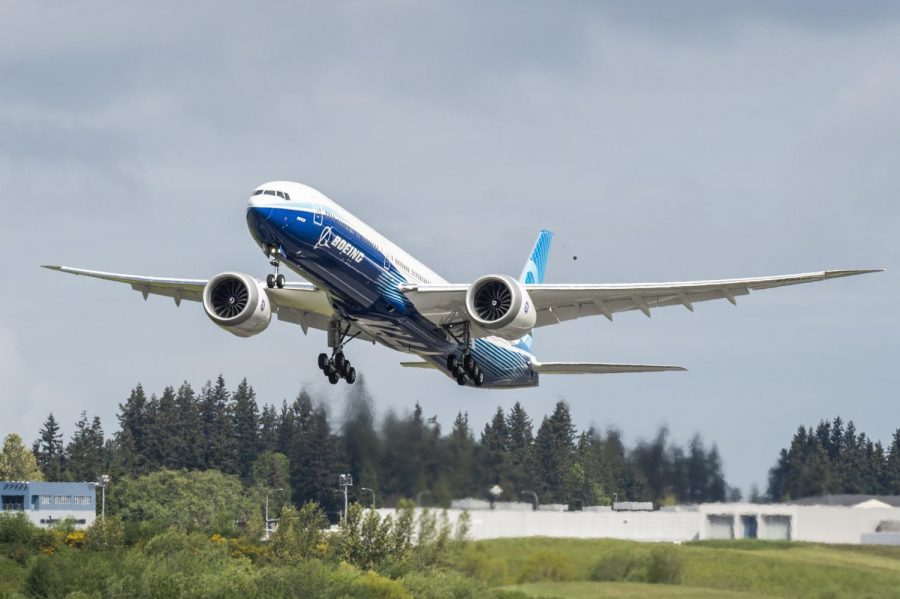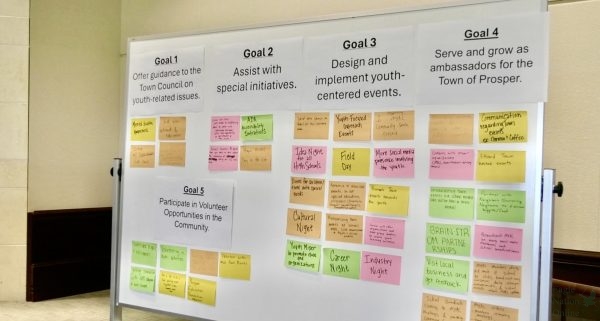Analysis: Boeing continues new aircraft development, how this could affect Airbus sales
According to Boeing, its 777x can fly up to 8,730 miles without re-fueling. Boeing continues its development and release-planning for an expected public sell date of the aircraft in 2021. While no U.S. airlines have shown interest, international-flying airlines, based overseas, already are placing orders. U.S. airlines plan to order more Airbus aircraft as Boeing’s stock continues to fall.
While it’s unclear when the airlines will be back to normal pre-COVID-19 business, Boeing, an aircraft manufacturer located in Seattle, Wash., despite canceled orders and lower credibility, continues to develop its new aircraft: the 777x.
So far, no U.S. corporations have placed orders for the aircraft, but international-airlines such as Emirates, British Airways, Lufthansa, and Singapore Airlines are the first to jump on board and are apart of eight airlines that show interest.
The Boeing 777x can fly up to 8,730 miles without re-fueling, which makes business and leisure travel easier, cheaper and more innovative than ever. But, with the hefty price tag of $442.2 million, most airlines can’t seem to scrape together the money, especially during the non-profitable pandemic.
The aircraft is an updated variant of their latest 777-300ER, popular among numerous U.S.-based airlines. The aircraft had its first and successful test flight Jan. 29, which prepped the corporation to begin distribution planning. However, due to the COVID-19 spread, and the limitations on international travel, many airlines are down-to-their-knees. In fact, since the COVID-19 pandemic, Boeing’s stock has plummeted more than 9%, leading many investors to jump in, but also causing many airlines to sell out.
In a matter of fact, Boeing has already been losing leadership. Take, for example, Southwest Airlines. The No. 3 ranked “top-used airline in the world” specifically only carries the Boeing 737 variants. After the 737-MAX 8 crash, Southwest had to ground the precautionary aircraft, which caused delays and a lower market for the airline as well. Now, despite rising back up, the airline faces a bigger downfall that could jeopardize their image.
Because of the plummeting stocks, safety precautions and overall usability, U.S.-based airlines such as Spirit, JetBlue, Delta and Frontier have been showing more interest in the cheaper, safer and easier-to-use manufacturer Airbus.
What’s becoming clear: Airbus and foreign aircraft manufacturers are heavily increasing in the United States. Fans of Airbus say because of Airbus’s a319, a320, and a321 (most popular passenger aircraft) and it’s ‘CFM’ engines, Airbus primarily needs less maintenance and argues to have less down-time than its U.S. competitor – Boeing.
To compare, Airbus aircraft have wider bodies than Boeing jets, offering more passenger comfort in terms of space. Many airlines also take into account the footprint of most Airbus aircraft, which allow for less white noise, and more airflow, limiting the feelings of jet-lag and restlessness on longer flights.
Recently due to the 737-MAX 8 crashes, and the presented safety concern of the Boeing protocols, Airbus’s credibility and safety recognitions have grown in the United States.
Because of the reasons presented above, Airbus’s popularity in the United States continues to increase, leading many U.S.-based companies to cancel their orders with Boeing and move to Airbus. During the COVID-19 pandemic, most airlines cannot afford to send mechanics to troubled flights, meaning, more Airbus planes are put into service to combat the unneeded delays.
In fact, American Airlines announced the retirement of its Boeing 757 and 767 jets, which have been rumored to be replaced with Airbus’s a321’s.
Even though air-travel will always change, the prospect and purpose of aviation is shifting. For example, aviation is, at this time, primarily used to transport a large group of people from one central, heavily populated, location to another accumulated city. On the contrary, in the future, the industry can be expected to be heavily modified for traveling extremely long distances, or extremely short, “urban” hops. This plans to add more connectivity between urban locations and corporations/businesses that are used in cities.
Because of the already-presented shift, the need for another, more expensive, long-range aircraft continues to being second-guessed by American companies.
Reporter Caleb Audia obtained this press release from direct contact with The Boeing Company.
Following Prosper High School, Audia plans to continue his education at Oklahoma University through their Bachelor’s Degree in Aviation program. Then he intends to shoot for the sky as part of American Airlines.
Your donation will support the student journalists of Prosper High School. Your contribution will allow us to purchase equipment and cover our annual website hosting costs.

Honors & Awards:
Best of SNO – "Feline friendship, Instagram allows family to help soldier" with Amanda Hare.
Best of SNO – "Junior overcomes dancing accident, bone transplant" with Christi Norris.
Best of SNO – "Podcast: History’s Forgotten – Season 2 – Episode 1 – Charles Whittlesey" with Amanda Hare & Christi Norris.
Best of SNO – "Podcast: History’s Forgotten – Season 2 – Episode 3 – Veterans Day" with Amanda Hare & Christi Norris.
2021 TAJE Honorable Mention – Caption Writing
2021 TAJE Honorable Mention – Story Portfolio
2021 Academic All-State
TAJE Fall Fiesta Honorable Mention – Video News Story "ENN students share common goals, look forward to new season"


















